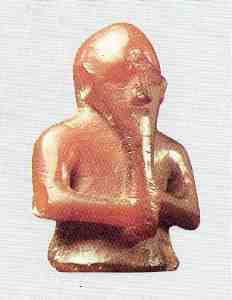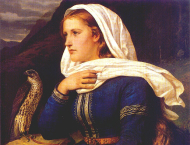The History of Hnefatafl
General Remarks on Tæfl's History
Below some written sources mentioning the Tafl game are cited and some historical finds are shown in case the legal position concerning the illustrations is clarified.
1. Jarl Rögnvaldr Kali Kolsson: Lausavísur
2. The Amber King of Roholte
3. The Saga of Friðþjóf the Bold
4. Tacitus - Germania
5. Völuspá - Prophecy of the Seeress
1. Jarl Rögnvaldr Kali Kolsson: Lausavísur (Orkn. 34)
|
Lausavísur (Orkn.34)
|
translation
|
|
Tafl emk örr at efla,
íþróttir kannk níu,
týnik trauðla rúnum,
tíð er mér bók ok smíðir.
Skríða kannk á skíðum,
skýtk ok ræ´k, svát nýtir,
hvárt tveggja kannk hyggja
harpslótt ok bragþóttu.
|
Tæfl can I play,
nine skills do I know,
hardly I forget the runes,
deal with books and smithing.
I can slide on skis,
shooting and rowing are useful,
both of two things I know,
playing harp and speaking poetry.
|
Content Overview
2. The Amber King of Roholte

A little figure made of yellow amber was found on the peninsula Feddet at the Præstø firth in the danish district Roholte.
It is assumed that this figure has functioned as a gaming piece in a board game.
So it is possible, that this figure wase used in a kind of hnefatafl-game as King or Hnefi.
That's why this figure is called the „Amber King of Roholte“.
The Amber King of Roholte can be seen in the „Oldtidssamling“ of the Danish national museum.
Content Overview
3. Friðþjófs saga ins frækna - The Saga of
Friðþjóf the Bold
|
II. KAPÍTULI
|
|
|
Hringr hét konungr, er réð fyrir
Svíþjóð.
Hann mælti einn tíma heimugliga
við vini sína: „Þat hefi ek spurt, at synir Bela konungs
hafa slitit vinfengi við Friðþjóf, er ágætastr
er allra þeira. Nú vil ek senda menn mína á
fund þeira, at þeir gangi á hönd mér, ella
mun ek gera lið á hendr þeim, ok mun laust fyrir liggja
því at þeir hafa hvárki við mér liðsafla
né vitsmuni, ok er gott á gamals aldri at vinna þá
yfir.“
Sendimenn kómu til Bela sona ok mæltu svá: „Svíakonungr
sendir ykkr orð ok vill, at þit gjaldið þeim skatt
eða berizt við hann ella.“
En þeir sögðust eigi vilja
þjóna honum á unga aldri við skömm ok svívirðing,
ok fóru sendimenn með þeim orðum aptr til konungs
síns.
En konungs synir söfnuðu liði ok fengu lítit
lið ok sendu orð Friðþjófi ok báðu
hann liðs, en hann sat at tafli, er sendimenn kómu til hans.
Þeir mæltu: „Konungar várir sendu þér kvedju
ok vildu þiggja liðsinni þitt til orrostu með sér.“
Hann svaraði engu ok mælti við Björn: „Leita ráðs
fyrir at tefla, því at tvíkostr er þér
á tvá vega,“
sagði hann.
Þá mæltu sendimenn: „Heyrir þú várt mál?“
Friðþjófr svarar þeim, hann kveðst löngu heyra, „en lið mun
ek þeim aldri veita.“
Síðan fóru sendimenn aptr
ok sögðu svá búit þeim bræðrum.
Eptir þat bjuggust þeir til ferðarinnar ok kváðu
þat mundu ráð að flytja systur sína í
Baldrshaga ok átta konur með henni, „Því at þar
er engi svá djarfr, at þar grandi neinu,“
því
at þar var hof mikit ok goðablót ok skíðgarðr
um hofit, ok skyldi þar ekki saman koma konur ok karlar.
Konungarnir fóru í hernað í
móti Hringi konungi, sem fyrr var sagt.
Þat var einn tíma,
er konungar báðir váru á burt farnir, at Friðþjófr
bað sína menn at setja fram skipit Elliða, „ok vitum,
hvárt hann kann ekki at skríða í Baldrshaga.“
Nú kómu þeir þar, ok váru viðtektir
góðar. Settist Friðþjófr hjá konungsdóttur,
ok allir hans menn skipuðu sæti.
Konungsdóttir mælti:
„Fast sækir þú, Friðþjófr, er þú
vilt halda hér fjórtánmenning í Baldrshaga.“
Hann svarar: „Ekki hirði ek um Baldr eða blót yður.
Jafngóðir eru mér þínir málsendar
hér sem heima.“
Þar skorti ekki drykk ok góða gleði.
Fór nú svá fram hvern dag, á meðan konungar
eru í burtu, at þeir fóru þangat at skemmta ser.
|
|
English Translation: The Saga of Friðþjóf the Bold
|
II. Chapter
|
|
|
There was a king named Ring, who ruled over Ringrealm (Sweden),
which also was in Norway: a mighty folk-king he was, and a great man,
but come by now unto his latter days.
Now he spake to his men: „Lo, I have heard that the sons of King Bele have brought to nought their friendship with Frithiof, who is the noblest of men; wherefore will I send men to these kings, and bid them choose whether they will submit them to me and pay me tribute, or else that I bring war on them: and all things then shall lie ready to my hand to take, for they have neither might nor wisdom to withstand me; yet great fame were it to my old age to overcome them."
After that fared the messengers of King Ring, and found those brethren, Helge and Halfdan, in Sogn, and spake to them thus: „King Ring sends bidding to you to send him tribute, or else will he war against your realm."
They answered and said that they would not learn in the days of their youth what they would be loth to know in their old age, even how to serve King Ring with shame. „Nay, now shall we draw together all the folk that we may."
Even so they did; but now, when they beheld their force that it was but little, they sent Hilding their fosterer to Frithiof to bid him come help them against King Ring. Now Frithiof sat at the knaveplay (Hnefatafl) when Hilding came thither, who spake thus: „Our kings send thee greeting, Frithiof, and would have thy help in battle against King Ring, who cometh against their realm with violence and wrong."
Frithiof answered him nought, but said to Björn, with whom he was playing: „A bare place in thy board, foster-brother, and nowise mayst thou amend it; nay, for my part I shall beset thy red piece there, and wot whether it be safe."
Then Hilding spake again:
„King Helge bade me say thus much, Frithiof, that thou shouldst go on this journey with them, or else look for ill at their hands when they at the last come back."
„A double game, foster-brother," said Björn; „and two ways to meet thy play."
Frithiof said: „Thy play is to fall first on the knave, yet the double game is sure to be."
No other outcome of his errand had Hilding: he went back speedily to the kings, and told them Frithiof's answer.
They asked Hilding what he made out of those words. He said:
„Whereas he spake of the bare place he will have been thinking of the lack in this journey of yours; but when he said he would beset the red piece, that will mean Ingeborg, your sister; so give ye all the heed ye may to her. But whereas I threatened him with ill from you, Björn deemed the game a double one; but Frithiof said that the knave must be set on first, speaking thereby of King Ring."
So then the brethren arrayed them for departing; but, ere they went, they let bring Ingeborg and eight women with her to Baldershage (Tempel of the God Balder), as to go see her thither, since there was none who durst make riot there.
Then fared those brethren south to Jadar, and met King Ring in Sogn-Sound.
Now, herewith was King Ring most of all wroth that the brothers had said that they accounted it a shame to fight with a man so old that he might not get a-horseback unholpen.
|

Ingeborg
(Peter Nicolai Arbo)
|
Content Overview
4. Tacitus - Germania
24. Genus spectaculorum unum atque in omni coetu idem. Nudi iuvenes, quibus id ludicrum est,
inter gladios se atque infestas frameas saltu iaciunt. Exercitatio
artem paravit, ars decorem, non in quaestum tamen aut mercedem: quamvis
audacis lasciviae pretium est voluptas spectantium. Aleam, quod mirere,
sobrii inter seria exercent, tanta lucrandi perdendive temeritate, ut,
cum omnia defecerunt, extremo ac novissimo iactu de libertate ac de
corpore contendant. Victus voluntariam servitutem adit: quamvis
iuvenior, quamvis robustior adligari se ac venire patitur. Ea est in re
prava pervicacia; ipsi fidem vocant. Servos condicionis huius per
commercia tradunt, ut se quoque pudore victoriae exsolvant.
English Translation:
One and the same kind of spectacle is always exhibited at every gathering. Naked youths who practise the sport bound in the dance amid swords and lances that threaten their lives. Experience gives them skill and skill again gives grace; profit or pay are out of the question; however reckless their pastime, its reward is the pleasure of the spectators. Strangely enough they make games of hazard a serious occupation even when sober, and so venturesome are they about gaining or losing, that, when every other resource has failed, on the last and final throw they stake the freedom of their own persons. The loser goes into voluntary slavery; though the younger and stronger, he suffers himself to be bound and sold. Such is their stubborn persistency in a bad practice; they themselves call it honour. Slaves of this kind the owners part with in the way of commerce, and also to relieve themselves from the scandal of such a victory.
Source:
Tacitus, The Agricola and Germania, A. J. Church and W. J. Brodribb, trans., (London: Macmillan, 1877), pp. 87ff
*Additional Information:
There are often explanations, so called glosses, at the end of many latin handwritings of the Middles Ages.
Such glosses were collected in books called glossaries.
Some glossaries contain regarding the Tæfl-game items like these:
ludere tabulis ... spillone zaplis und alea ... zabel (A.v.d. Linde, S.55-56, Old High German)
alea ... teblas (Épinal Glossary, Old English)
alea ... tefil (Erfurt Glossary, Old English)
alea ... tæfel, aleae ... tæfelstanas, aleator ... tæflere, pirgus ... cyningstan on tæfle, lepuscula ... feðerscite tæfel (Ælfrics Vokabulary).
Reminding the sentence of Julius Caesar „Alea iacta est“ („The die has been cast“)
„Aleam“ can be translated as „game of dice“.
But if you look at the glossary items mentioned above, the translation as æfl (Tafl, Hnefatafl) is possible, too.
It is pobably a kind of Back Gammon (Kvátrutafl).
Content Overview
4. Völuspá - (Edda Sæmundar hinns Fróda)
|
Völuspá 7 and 8
|
Translation
|
|
Hittusk æsir
á Iðavelli,
þeir er hörg ok hof
hátimbruðu,
afla lögðu,
auð smíðuðu,
tangir skópu
ok tól gerðu.
Tefldu í túni,
teitir váru,
var þeim vættugis
vant ór gulli,
uns þrjár kvámu
þursa meyjar
ámátkar mjök
ór Jötunheimum.
|
The Anses met
at Ithavoll,
Hörg (Shrine) and Hof (temple)
they timbered high,
Forges they set,
and they smithied ore,
Tongs were wrought,
and tools they fashioned.
They played tafl, In their dwellings,
at frith (peace),
Of gold no lack,
did the gods then know,
Till thither came up
etin-maids three,
Hugh of might,
out of Jötunheim.
|
|
Völuspá 61
|
Translation
|
|
Þar munu eftir
undursamligar
gullnar töflur
í grasi finnask,
þærs í árdaga
áttar höfðu.
|
In wondrous beauty
once again
shall the golden taflstones stand
in the grass,
which the gods had owned,
in days of old.
|
Content Overview
Home

